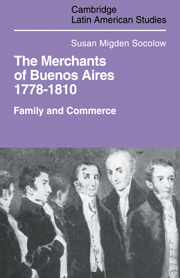Book contents
- Frontmatter
- Contents
- Dedication
- Acknowledgments
- Glossary
- Weights, measures and money
- Introduction
- 1 The merchant population
- 2 Women, marriage and kinship
- 3 Commerce and investment
- 4 Life style
- 5 Religious participation
- 6 Political and social awareness
- 7 Gaspar de Santa Coloma, merchant of Buenos Aires
- Conclusion
- Appendices
- Notes
- Bibliography
- Index
2 - Women, marriage and kinship
Published online by Cambridge University Press: 04 August 2010
- Frontmatter
- Contents
- Dedication
- Acknowledgments
- Glossary
- Weights, measures and money
- Introduction
- 1 The merchant population
- 2 Women, marriage and kinship
- 3 Commerce and investment
- 4 Life style
- 5 Religious participation
- 6 Political and social awareness
- 7 Gaspar de Santa Coloma, merchant of Buenos Aires
- Conclusion
- Appendices
- Notes
- Bibliography
- Index
Summary
The marriage patterns of the merchants are important as they are linked to their patterns of social mobility. In addition, marriage provided the merchants with a means of cementing individuals and families into kinship groups and clans. Therefore the social and geographical background of the women whom the merchants married, as well as the social and legal position of the women themselves, were crucial to the organization and life patterns of the merchant group.
Not surprisingly, women in Spanish colonial society were thought of as inferior beings simply because of their female status; the very condition of being a woman consigned the female to a lesser rank than that of a man. Although she had limited legal rights (such as the right to inherit), no upper or middle class woman could enter a profession, as she was felt to be incapable of any life outside her home. Only three options were open to the women of Buenos Aires: marriage, spinsterhood, or entrance into a cloistered nunnery.
From reports of travelers to Buenos Aires it is apparent that women who chose marriage or spinsterhood were expected to lead a quiet, genteel life centering on home and church. In their homes and at fetes, women were not expected to display any intelligence, but rather to provide the gracious touch to entertaining – providing sweet and lively chatter, performing Spanish and French dances, playing the guitar and singing.
- Type
- Chapter
- Information
- Merchants of Buenos Aires 1778–1810Family and Commerce, pp. 34 - 53Publisher: Cambridge University PressPrint publication year: 1978
- 1
- Cited by



